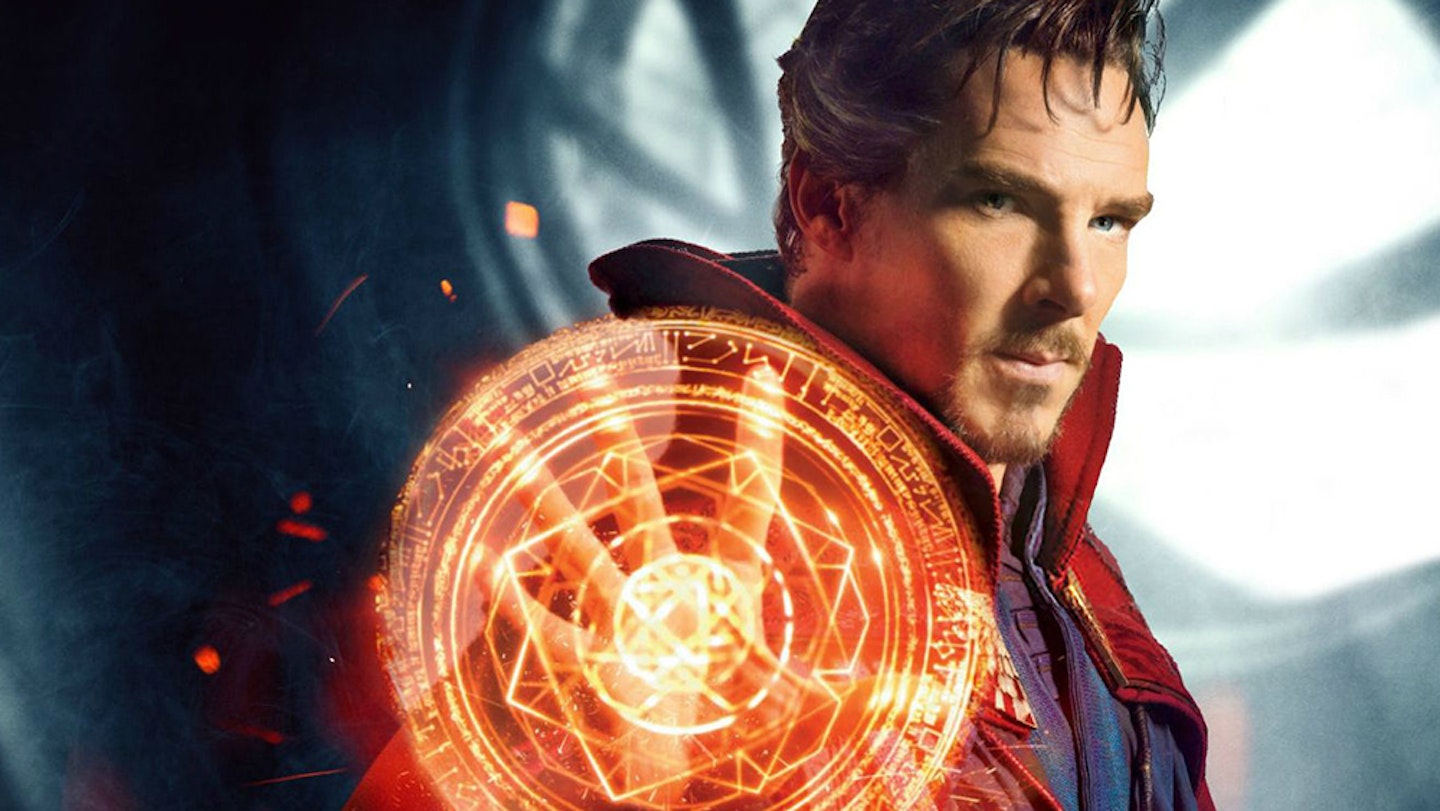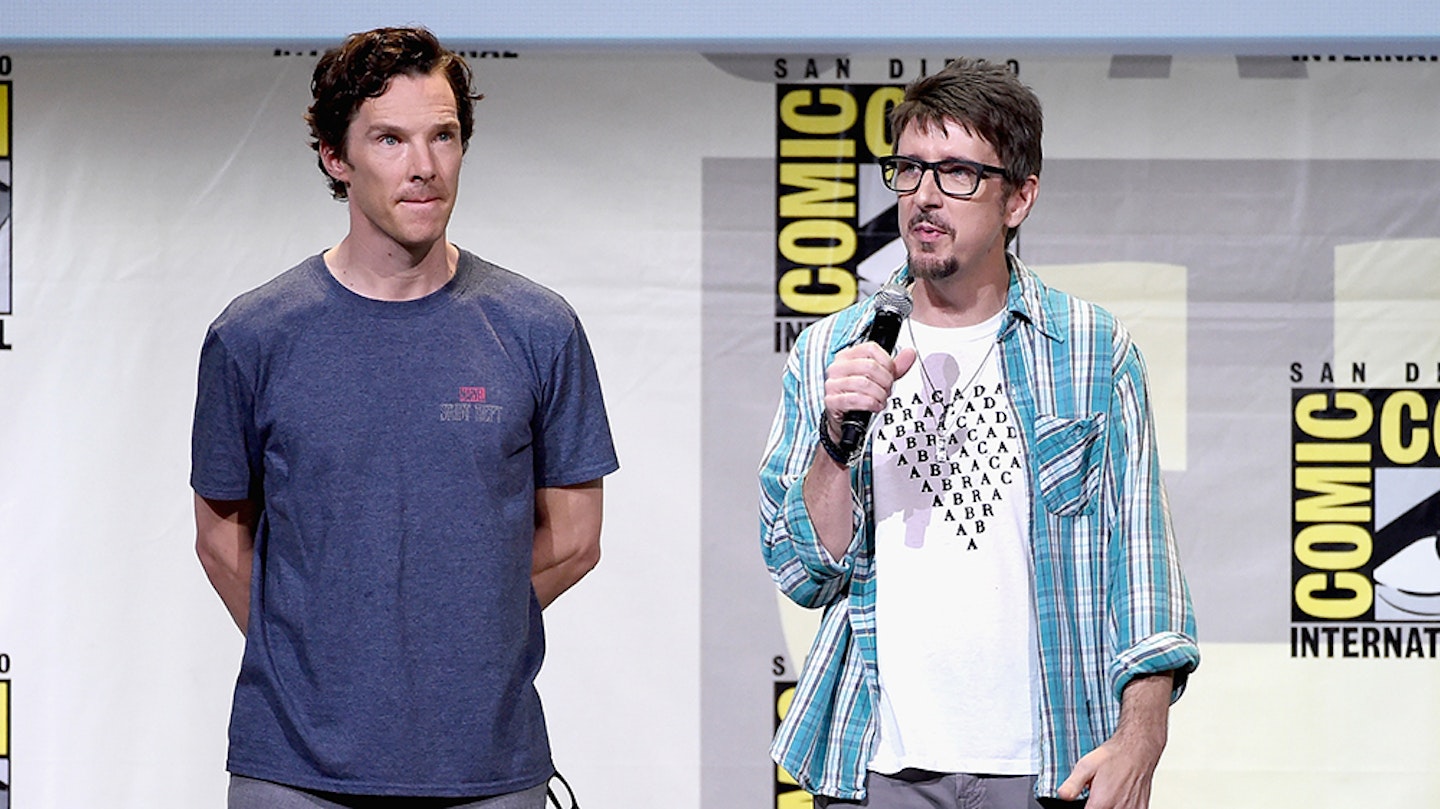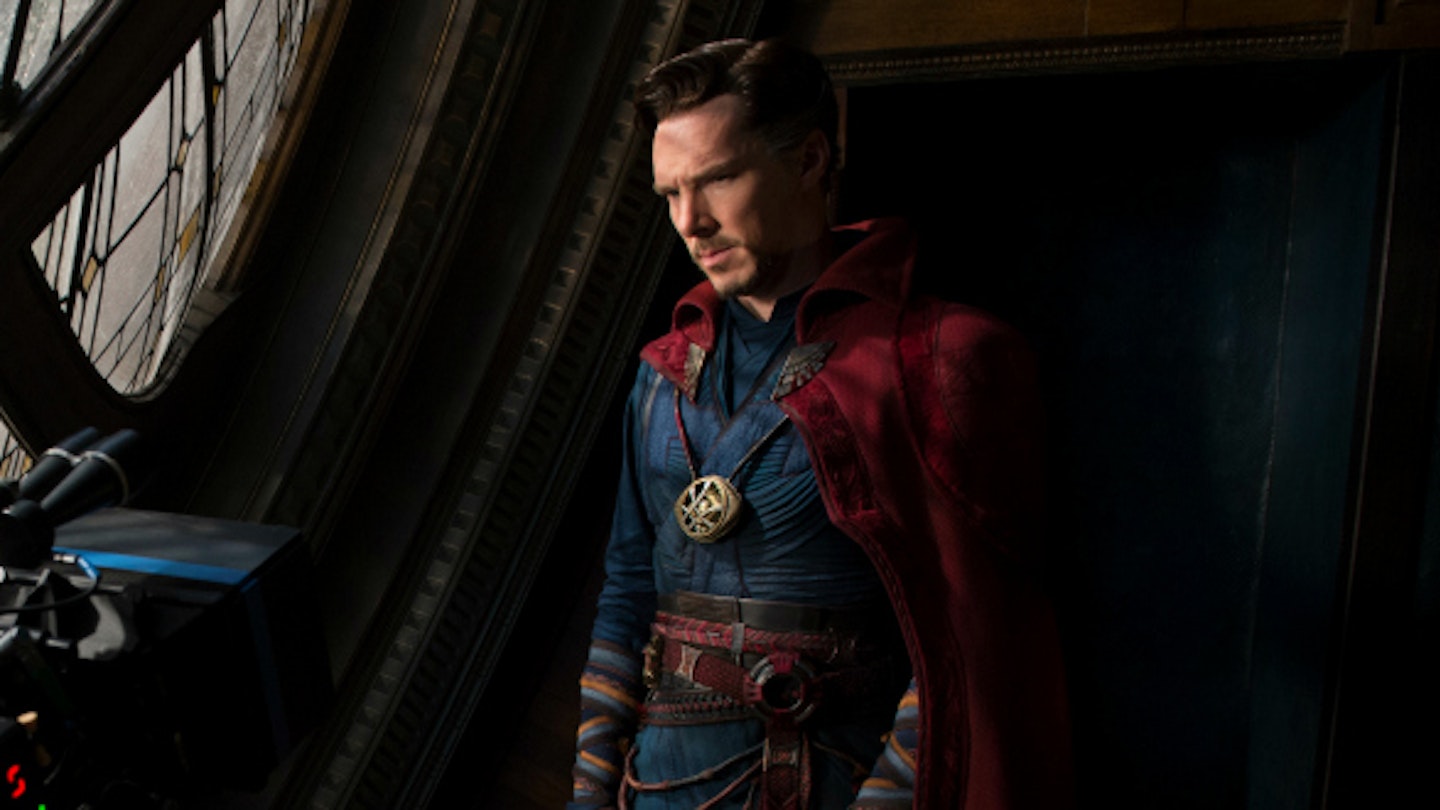For Doctor Strange director Scott Derrickson, Benedict Cumberbatch was always the only serious contender for the role of Stephen Strange, the humbled neurosurgeon who is reborn as an interdimensional sorceror. Cumberbatch talked to Empire on set and on the phone about suffering, fandom and where Marvel’s most mind-blowing hero goes next.

What did you have to do in Doctor Strange that you’d never done before?
I’ve done a bit of live action before but the fight sequences, the wire work and the physical regime were taken to another level. This is an origin story so there’s a certain room for me improving as well as the character improving. And I’ve never been front and centre as an iconic American character. Day to day, you know you’re painting on a very big canvas.
What feels new about Stephen Strange as a character?
Being someone who is of our sensual reality, he has a lifestyle, he has a sexuality, he’s materialistic. Those are more universal things than some of the characters I play, who are slightly sociopathic. I keep reminding people I can do ordinary. He’s less strange than other characters I’ve played. He’s lost the power to love, which doesn’t make him a nasty person. I just think he’s closed-off. It’s only when he has his accident and everything that he’s ever had in his life falls apart that he becomes pretty monstrous. It’s the self-loathing rage of a wounded animal and he doesn’t have a coping mechanism at all. It ties in with the discipline and the magic of this world. The biggest lesson he learns in this film is it’s not all about him.
Doctor Strange is *less* strange than other characters I’ve played. He’s lost the power to love but that doesn’t make him a nasty person.
And that’s hard for a neurosurgeon…
He’s selfish but he’s still saving lives. An inflated sense of self-importance? Absolutely, but I think it comes from his need to control things and that’s what happens to all surgeons, I think. There’s a huge degree of uncertainty and bafflement. We look at science as the ultimate answer for everything yet we are really messy organisms and when the two collide in the upper echelons of medicine you think science will prevail but it’s not always that way. For brain surgeons it’s particularly difficult to deal with failure. It was fascinating to learn about that whole world. I’m sad in a way that the character leaves it behind. It’s an amazing discipline.
Scott Derrickson says that the character is defined by suffering…
Kevin Feige said to me: “I don’t think we’ve ever put an actor through quite as much as this, physically and mentally.” I’ll wear that as a badge of honour. It was endless. I don’t wear a mask, I don’t have a suit. It’s not some CG double or a stunt double. The suffering the character goes through is immense! You’d have to be pretty hard-nosed not to feel some sympathy for the guy. It’s an interesting arc. You start with a character who’s likeable and charming but very arrogant and distant. He’s funny but you can see there are massive holes in his life. It’s a very painful transition and all that he becomes is tested so quickly and violently. He gets scraped off the floor and then thrown right down to hell again and then slowly pulls himself back up.
What makes him heroic?
It will be obvious to anyone who sees it that he earns that cloak. You think he’s doing all right and then you realise that there’s one massive lesson to learn. There’s a heroic amount of effort that goes into making him a superhero by the end of the film.

Were you already aware of Doctor Strange before Scott approached you?
Not at all. I’m quite surprised by how many people grew up with this character. He’s slightly more specialised than Spider-Man or Superman or Batman, but he’s very loved by people who know him. You’ve got to treat it with reverence but hold on to the fact that Marvel always make it fresh so you can give it your personal twist. When I heard how Scott wanted to go about it, I thought, “Okay, now I’m really into it.” Any fears or questions I had were put to rest.
Kevin Feige said to me: 'I don’t think we’ve ever put an actor through quite as much as this, physically and mentally.'
You were playing Hamlet on stage and had to turn the role down initially. Did you think your chance had gone?
I did think I had to kiss it goodbye because Marvel have to plot things for the next three, four years. If you can’t jump on board when the ride’s going past that’s it, it usually goes by, so the hugest compliment they paid me was to come back to me. It motivated me to try to fulfill their faith.
Was it daunting to take on a role that commits you to sequels and crossovers for years ahead?
I’ve done a few things like that, Sherlock being the most prevalent, and they’ve been really good fun. What’s not to look forward to? It’s like all the actors in all of the films. It’s difficult to get Martin Freeman and I in a room together. Imagine what it’s like to get myself, Chris Hemsworth, Robert Downey Jr., Elizabeth Olsen… these extraordinary actors who all have careers outside the Marvel Universe.
So you’re looking forward to interacting with the other characters?
Definitely. That’s why this character is being introduced, to open up the next chapter. And it spectacularly does that on a dimensional level, so watch this space to see how that unfolds. As an actor, to be part of that story’s terrific. I’ve enjoyed it so much as a fan and now I’m getting to have a go myself.
How did you find working with Scott Derrickson?
He’s terrific, really sharp on the details, and he’s not afraid to go to dark places. He breathes humour into a character with a very strong identity in the ‘60s and ‘70s, that psychedelia era of Eastern mysticism meeting the West. I wanted to take the audience on a journey where that transition was funny and awkward. It’s the same cynicism that [Strange] has. I was very keen to work on the script with Scott and [C. Robert] Cargill, and working out the important story beats, changing lines, upping the comedy, changing the pace, all of that was great fun. Even though he’s an established character, when you’re doing an origin story there’s a lot of room for manoeuvre.
What about the fight scenes?
Sometimes when you do fight scenes you think, “Oh, I’ll be hit in the face,” because people get carried away with their vanity and want to look too cool to care, but we were all really careful with each other. Mads [Mikkelsen] and I have a really epic brawl — a week shoot, lots of rehearsal — and he was just delightful. He’s a dancer and a gymnast so he knows how to plant the moves. He was always saying, “Are you okay?” When you’ve got that level of mutual consideration you form a family very quickly.
Tell us about your visit, in full costume, to that comic-book store in New York.
That’s probably the only time I’ll do that. I’m not one for doing the children’s party version: “Hi, I’m a character in a movie and now I’m in reality!” I was doing the last shot of the film before reshoots outside their shop. I was starting my run into the frame and I thought, “You are literally ending where this began. The loop of serendipity’s too much to not go in and acknowledge it.” I just wanted to see the look on their faces.
Have any other crazy New York memories stayed with you?
It’d got crazy the day before that, when we were filming on a street near the Sanctum in New York. I decided to avoid it for five minutes by going up the road to a café with my wife and a group of friends. It was that typical New York thing, like that scene in Ghostbusters where Rick Moranis comes running through Central Park chased by one of the dogs of doom and bangs on the glass of the restaurant going, “Help! Help!” Everyone stops what they’re doing and watches, then he disappears from shot and it cuts back to the restaurant and everyone’s talking… In New York they take the hit and move on really quick. I was having normal conversations within five minutes of being in that café.
Listen to Mads Mikkelsen talking Doctor Strange on the Empire Podcast
Want to go further? Empire’s essential guide to Benedict Cumberbatch’s filmography can be found here
